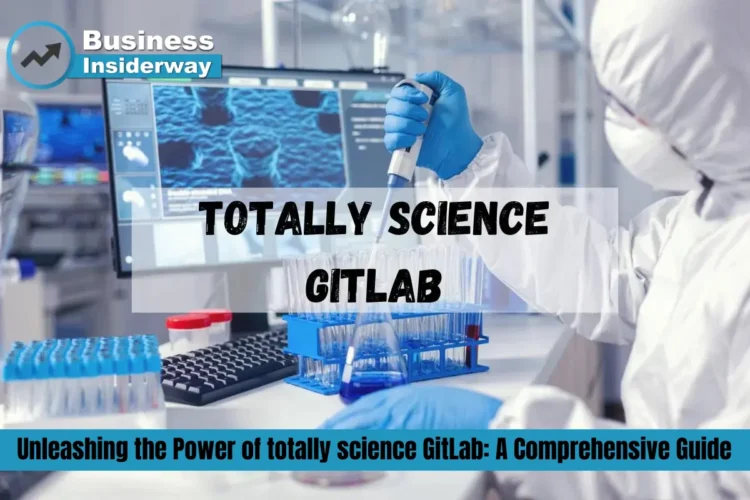Introduction to Totally Science Gitlab
Welcome to the future of scientific collaboration and innovation with Totally Science Gitlab! Imagine a platform where researchers worldwide can seamlessly work together, share data, and accelerate groundbreaking discoveries. Say goodbye to siloed research efforts and hello to a vibrant community dedicated to pushing the boundaries of science. In this comprehensive guide, we will delve into the myriad benefits, features, and real-life case studies showcasing the Power of Totally Science Gitlab in revolutionizing scientific research. Let’s embark on this exciting journey together!
Benefits of Using Totally Science Gitlab for Scientific Research
Are you a researcher looking for a streamlined platform to manage scientific projects? Look no further than Totally Science Gitlab! This powerful tool offers numerous benefits that can enhance your research experience.
One key benefit of using Totally Science Gitlab is its centralized system, which allows you to store all project-related data in one secure location. No more scattered files and emails—everything you need is right at your fingertips!
Additionally, the platform provides version control, enabling you to track changes made to your work over time. Say goodbye to confusion and hello to organized collaboration with colleagues.
Moreover, Science Gitlab offers seamless integration with various tools and plugins, enhancing data analysis and visualization efficiency. With these features at your disposal, conducting cutting-edge research has never been easier!
Features and Tools of Totally Science Gitlab
Totally Science Gitlab offers many features and tools tailored specifically for scientific research projects. From version control to issue tracking, this platform has everything you need to streamline your work efficiently. One standout feature is the integrated CI/CD pipelines that automate testing and deployment processes, saving researchers valuable time.
The robust code review system allows team members to collaborate seamlessly, ensuring high-quality research outputs. With built-in project management tools like Kanban boards and milestone tracking, staying organized has always been challenging. Plus, the ability to create custom workflows caters to the unique needs of different research teams.
Science Gitlab provides powerful data visualization tools for data-driven projects, making analyzing complex datasets a breeze. The interactive Jupyter Notebook integration further enhances collaboration by allowing real-time sharing and editing of Python scripts. In essence, Science Gitlab empowers researchers with a comprehensive suite of features designed to improve productivity and drive impactful discoveries in the scientific community.
How to Set Up a Project on Totally Science Gitlab
Setting up a project on Totally Science Gitlab is straightforward and can streamline your research workflow. To begin, create an account and log in to the platform. Once logged in, click on the “New Project” button and fill out the necessary project details, such as name, description, and visibility settings.
Next, you can initialize your project with a README file or import an existing repository. This step will help you kickstart your project with essential information or seamlessly bring in any existing work.
Once your project is set up, you can add files, code snippets, datasets, and documentation to organize your research effectively. You can also utilize the issue tracker feature to manage tasks and collaborate with team members efficiently.
Familiarize yourself with branching strategies and merge requests to track changes and contributions from collaborators seamlessly. By following these steps, you’ll be well on your way to leveraging Totally Science Gitlab for successful research projects!
Collaborating on Projects using Totally Science Gitlab
Regarding collaborating on scientific research projects, Totally Science Gitlab provides a seamless platform for teams to work together efficiently. With its user-friendly interface and robust features, researchers can easily share data, track progress, and communicate effectively within their projects.
One key advantage of using Totally Science Gitlab for collaboration is the ability to create project milestones and assign tasks to team members. This helps keep everyone on track and ensures that deadlines are met promptly.
Additionally, the platform allows real-time collaboration through features like commenting on code snippets, merging branches, and conducting code reviews. This level of interaction fosters innovation and encourages open communication among team members.
By utilizing Science Gitlab’s collaborative tools, research teams can streamline their workflow, enhance productivity, and ultimately achieve groundbreaking results in their scientific endeavours.
Best Practices for Efficiently Using Totally Science Gitlab
Some best practices can help you work efficiently when maximizing the potential of Totally Science Gitlab for your research projects.
Utilizing the project management features within Gitlab will ensure clear communication among team members. This will help everyone stay on the same page and track progress effectively.
Use issue-tracking tools to assign tasks, set deadlines, and monitor the status of each task in real-time. This can streamline workflow and prevent bottlenecks in your project.
Furthermore, use Gitlab’s version control capabilities to record changes made to your project files. This will help you track progress and revert to previous versions if needed.
Update and maintain documentation regularly within Gitlab to clarify processes, methodologies, and results achieved during the project. This will ensure continuity even if team members change or new collaborators join.
Case Studies: Real-Life Examples of Successful Research Projects on Totally Science Gitlab
Imagine a team of researchers worldwide coming together to work on groundbreaking projects in various scientific fields. With Totally Science Gitlab, collaboration becomes seamless and efficient.
One case study involves a group of biologists studying the effects of climate change on marine ecosystems. By utilizing the project management tools and version control features in Totally Science Gitlab, they could analyze data effectively and publish their findings faster than ever before.
Another example is a team of engineers developing cutting-edge technology for renewable energy solutions. Using the continuous integration and deployment tools offered by Totally Science Gitlab, they successfully launched their prototype ahead of schedule.
These real-life examples showcase how Science Gitlab empowers researchers to innovate, collaborate, and succeed in their scientific endeavours.
Conclusion
Totally Science Gitlab is a robust platform that offers researchers in the scientific community an efficient and collaborative environment to streamline their projects. With its comprehensive features and tools, easy project setup, and seamless collaboration capabilities, Science Gitlab unleashes the Power of modern technology for scientific research. By following best practices and learning from successful case studies, researchers can maximize the potential of Totally Science Gitlab for their projects. Embrace this innovative tool to revolutionize your research efforts and propel scientific discoveries forward in a more streamlined and effective manner.














